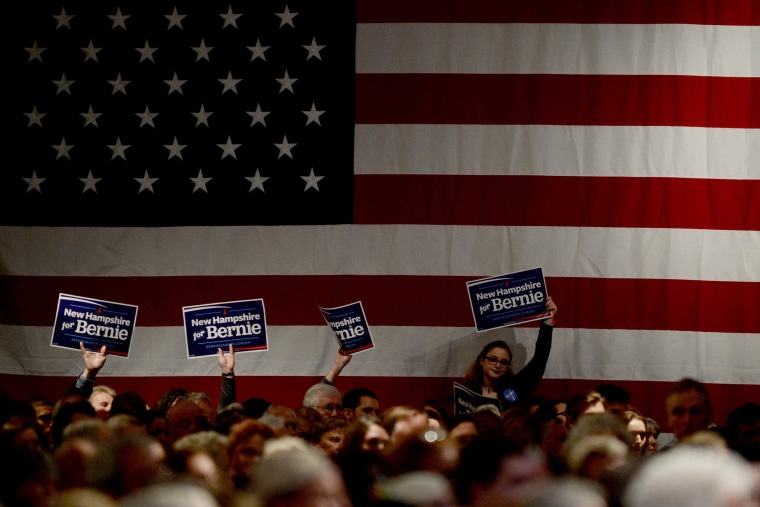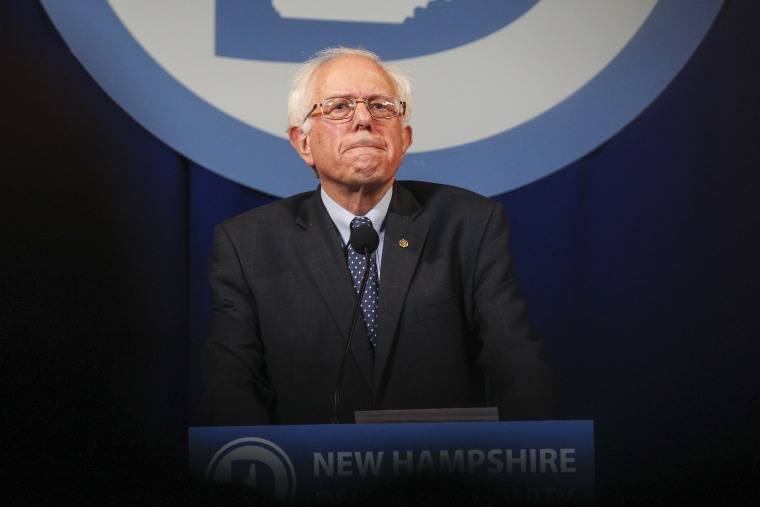MANCHESTER, New Hampshire -- It looks like it's New Hampshire or bust for Bernie Sanders, who is counting on a win here to give him the momentum he needs to continue fighting Hillary Clinton into the spring. And that makes the state potentially the most important of the early nominating contests.
On a swing through New Hampshire last weekend, Sanders thrilled crowds of more than a thousand, donned a reindeer hat at a holiday parade, and was introduced by his son, Levi, who lives in Claremont. Fans lined up for hours in Keene, and he packed a giant room at Plymouth State University on a Saturday night, when many students would typically not be taking in a lecture from a septuagenarian.
While the Sanders campaign is hardly writing off Iowa, where the candidate is spending this weekend, and whose Feb. 1 caucuses kick off the presidential contest, his aides are increasingly talking about Iowa as a place they need to make a strong showing or to outperform expectations – not necessarily to win.
In New Hampshire, however, which holds its primary on Feb. 9, there is only one option. “I wake up every morning and tell myself that New Hampshire is a must-win,” Sanders’ New Hampshire state director Julia Barnes told MSNBC. “I think strategically there is a great amount of importance for us to do well here … No one is going to say that it’s not a must-win.”
Sanders may need to win both Iowa and New Hampshire to pose a clear, mortal threat to Clinton. But a win in either state will keep him and his message alive to fight another day.
A win in neither would be the end of the line.
While the two contests that come immediately after -- Nevada and South Carolina -- are demographically challenging for Sanders, his team is eyeing primaries and caucuses in Colorado, Minnesota, Massachusetts, and his native Vermont, all of which occur on March 1, as possible victories.
They are also keeping an eye on Georgia and Texas, where Sanders was the first Democrat to open campaign offices. But a win New Hampshire is crucial to Sanders’ overall strategy. “I think we have an excellent chance to win here in New Hampshire,” Sanders said in Plymouth last weekend. “And if we win here in New Hampshire, and we win in Iowa -- I think we’ve got a strong chance to win in Iowa, as well -- we have a path toward victory.”
RELATED: Labor dispute shakes up Democratic debate
At first, many analysts expected Sanders would focus on Iowa, where Clinton finished third in 2008 and where grassroots voter intensity can carry the day in the intensive caucus format.
Sanders closed in on Clinton there all summer and ran neck-and-neck with her throughout September, but the former secretary of state has since pulled away. With less than two months to go, she’s now leading Sanders by 22 points in the most recent Monmouth University poll.
The story is very different in New Hampshire, next door to his home state of Vermont, where this week's CNN poll placed Sanders a full 10 percentage points ahead of Clinton. So it’s New Hampshire where he will make his stand.
Sanders’ campaign has invested heavily in the state, employing 70 paid staffers in 15 offices, according to his campaign, which they note is larger than Clinton’s 11 offices.
“I wake up every morning and tell myself that New Hampshire is a must-win.” '
And while Clinton’s team began airing television advertisements months before Sanders, his campaign has now been outspending hers each of the five weeks they’ve been on the air. He’s spent a total of $3.6 million in the state since early November, when he ran his first ad, compared to Clinton’s $2.4 million for the same period.
After focusing much of his travel on Iowa in summer and early fall – including an entire month when he did not visit New Hampshire once – Sanders is spending more time the Granite State. He made three trips in November, one last week, and plans for around next week’s ABC News debate in Manchester.
Clinton’s campaign, meanwhile, is trying to keep expectations in check even as they tout their impressive ground game and the fact that all of the state’s major Democratic elected officials have endorsed her.
RELATED: Bernie Sanders' biggest limitation
“Our approach has been to acknowledge and be realistic about the competitive nature of the primary,” Clinton state director Mike Vlacich told MSNBC. “Neighboring state Democrats haven’t lost the New Hampshire primary.” The only recent case of a next-door stater losing in New Hampshire, he noted, is Vermont’s Howard Dean -- who lost the 2004 primary to another New Hampshire neighbor, Massachusetts’ John Kerry.
Clinton’s ties are strong in the state, but tempered. She won the 2008 Democratic primary here, but it was an upset after polls showed her losing in the days before voters headed to the polls. And while New Hampshire saved Bill Clinton’s 1992 presidential bid by making him the “Comeback Kid,” he still came in second.

Still, her team has demonstrated they can turn out hundreds of supporters at key Democratic Party events, like last month's Jefferson-Jackson dinner, which are a sort of dress rehearsal for Election Day. “If it were held today, I think Clinton would have a small advantage by virtue of her organization in the state,” said University of New Hampshire political scientist Dante Scala. “But there’s an awful lot of volatility in that last week before New Hampshire votes.”
Sanders' campaign is already preparing for that critical week between the Iowa Caucus and New Hampshire primary, planning to flood the state with surrogates and celebrity endorsers.
In the last Democratic primary in 2008, 17% of voters said they made a decision on the day they went to the polls, while 31% said they decided in the final week, according to exit polls.
But polling is notoriously difficult in the state, which has a large number of independents who can vote in either party’s primary. And since Sanders is especially strong among those not aligned voters, he risks losing a chunk of supporters who might chose to vote in the more competitive Republican primary.
One factor neither campaign seems particularly worried about is Martin O’Malley, the longshot candidate currently polling at 1% who has staked his hopes to Iowa. “He’s not a factor,” Barnes shrugged.
Instead, she’s focusing on solidifying her candidate’s strength. “There is definitely going to a moment here, there’s no question,” she said.
Correction: This story originally misstated the results of the 2004 Democratic primary in New Hampshire. John Kerry beat Howard Dean.
